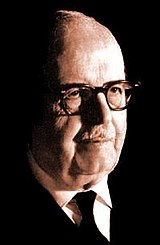Bernardo A. Houssay
| Bernardo Houssay | |
|---|---|

Bernardo Houssay
|
|
| Born |
Bernardo Alberto Houssay April 10, 1887 Buenos Aires, Argentina |
| Died | September 21, 1971 (aged 84) Buenos Aires, Argentina |
| Nationality | Argentine |
| Known for | Glucose |
| Awards | Nobel Prize for Physiology or Medicine (1947) |
| Scientific career | |
| Fields | Physiology, endocrinology |
Bernardo Alberto Houssay (April 10, 1887 – September 21, 1971) was an Argentine physiologist who, in 1947, received one half Nobel Prize for Physiology or Medicine for his discovery of the role played by pituitary hormones in regulating the amount of blood sugar (glucose) in animals. He is the first Latin American Nobel laureate in the sciences. He shared the prize with Carl Ferdinand Cori and Gerty Cori, who won for their discoveries regarding the role of glucose in carbohydrate metabolism).
Bernardo Alberto Houssay was born in Buenos Aires, to émigrés from France, Albert and Clara Houssay. A precocious youngster, he was admitted to the Pharmacy School at the University of Buenos Aires at 14 years of age and subsequently to the Medical School of the same University from 1904 to 1910, beginning when he was only 17 years old. While a third year medical student, Houssay took up a post as a research and teaching assistant in the Chair of Physiology.
After graduating, he quickly developed and presented his M.D. thesis on the physiological activities of pituitary extracts, published in 1911, a theme he would pursue for the rest of his scientific career. Since 1908 he was already an assistant lecturer in the same department, and immediately after his doctorate he took up the post of Professor of Physiology in the University's School of Veterinary Medicine. Simultaneously, he started a private practice and as assistant physician at the municipal hospital of Buenos Aires. In 1913 he became Chief Physician at the Alvear Hospital, and, in 1915, Chief of the Section of Experimental Pathology at the National Public Health Laboratories in Buenos Aires.
...
Wikipedia
